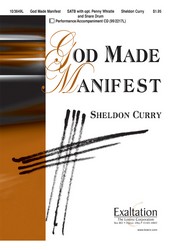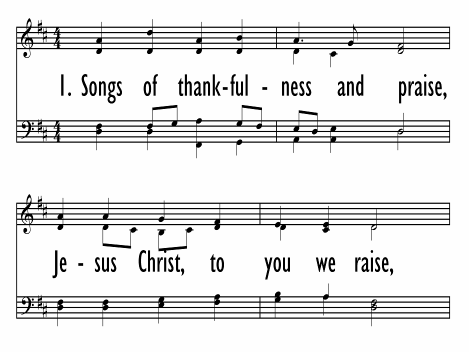- |
User Links
Songs of Thankfulness and Praise

Songs of thankfulness and praise
Author: Christopher Wordsworth (1862)Published in 131 hymnals
Printable scores: PDF, MusicXMLPlayable presentation: Lyrics only, lyrics + musicAudio files: MIDI, Recording
Representative Text
1 Songs of thankfulness and praise,
Jesus, Lord, to you we raise,
manifested by the star
to the Magi from afar,
branch of royal David's stem,
in your birth at Bethlehem.
Anthems be to you addressed,
God in man made manifest.
2 Manifest at Jordan's stream,
Prophet, Priest, and King supreme,
and at Cana, wedding guest,
in your Godhead manifest;
manifest in pow'r divine,
changing water into wine.
Anthems be to you addressed,
God in man made manifest.
3 Manifest in making whole
palsied limbs and fainting soul;
manifest in valiant fight,
quelling all the devil's might;
manifest in gracious will,
ever bringing good from ill:
Anthems be to you addressed,
God in man made manifest.
4 Sun and moon shall darkened be,
stars shall fall, the heav'ns shall flee.
Christ will then like lightning shine;
all will see his glorious sign.
All will then the trumpet hear,
all will see the judge appear.
You by all will be confessed,
God in man made manifest.
5 Grant us grace to see you, Lord,
mirrored in your holy Word.
May our lives and all we do
imitate and honor you
that we all like you may be
at your great epiphany
and may praise you, ever blest,
God in man made manifest.
Source: Christian Worship: Hymnal #386
Author: Christopher Wordsworth
 Christopher Wordsworth--nephew of the great lake-poet, William Wordsworth--was born in 1807. He was educated at Winchester, and at Trinity College, Cambridge, where he graduated B.A., with high honours, in 1830; M.A. in 1833; D.D. in 1839. He was elected Fellow of his College in 1830, and public orator of the University in 1836; received Priest's Orders in 1835; head master of Harrow School in 1836; Canon of Westminster Abbey in 1844; Hulsean Lecturer at Cambridge in 1847-48; Vicar of Stanford-in-the-Vale, Berks, in 1850; Archdeacon of Westminster, in 1865; Bishop of Lincoln, in 1868. His writings are numerous, and some of them very valuable. Most of his works are in prose. His "Holy Year; or, Hymns for Sundays, Holidays, and other occ… Go to person page >
Christopher Wordsworth--nephew of the great lake-poet, William Wordsworth--was born in 1807. He was educated at Winchester, and at Trinity College, Cambridge, where he graduated B.A., with high honours, in 1830; M.A. in 1833; D.D. in 1839. He was elected Fellow of his College in 1830, and public orator of the University in 1836; received Priest's Orders in 1835; head master of Harrow School in 1836; Canon of Westminster Abbey in 1844; Hulsean Lecturer at Cambridge in 1847-48; Vicar of Stanford-in-the-Vale, Berks, in 1850; Archdeacon of Westminster, in 1865; Bishop of Lincoln, in 1868. His writings are numerous, and some of them very valuable. Most of his works are in prose. His "Holy Year; or, Hymns for Sundays, Holidays, and other occ… Go to person page >Text Information
Related Texts
| First Line: | Songs of thankfulness and praise |
| Title: | Songs of Thankfulness and Praise |
| Author: | Christopher Wordsworth (1862) |
| Meter: | 7.7.7.7 D |
| Language: | English |
| Copyright: | Public Domain |
- (hymns)
- (hymns)
- (hymns)
- (hymns)
- (hymns)
- (hymns)
- (hymns)
- (hymns)
- (hymns)
- (hymns)
- (hymns)
- (hymns)
- (hymns)
- (hymns)
- (hymns)
- (hymns)
- (hymns)
- (hymns)
- (hymns)
- (hymns)
- (hymns)
- (hymns)
- (hymns)
- (hymns)
- (hymns)
- (hymns)
- (hymns)
- (hymns)
- (hymns)
- (hymns)
- (hymns)
- (hymns)
- (hymns)
- (hymns)
- (hymns)
- (hymns)
- (hymns)
- (hymns)
- (hymns)
- (hymns)
- (hymns)
- (hymns)
- (hymns)
- (hymns)
- (hymns)
- (hymns)
- (hymns)
- (hymns)
- (hymns)
- (hymns)
- (hymns)
- (hymns)
- (hymns)
- (hymns)
- (hymns)
- (hymns)
- (hymns)
- Year A, Epiphany season, Baptism of the Lord (First Sunday)
Relates to Matthew 3 (NPM) - Year A, Epiphany season, Second Sunday
Related to John 1 (NPM) - Year A, Epiphany season, Third Sunday
This is recommended for Year A, Epiphany season, Third Sunday by 2 hymnal lectionary indexes including Lift Up Your Hearts: psalms, hymns, and spiritual songs #104. - Year A, Lent, Third Sunday
- Year C, Epiphany season, Second Sunday
This is recommended for Year C, Epiphany season, Second Sunday by 2 hymnal lectionary indexes including Lift Up Your Hearts: psalms, hymns, and spiritual songs #104. - Year C, Epiphany season, Second Sunday
English
- A Church of England Hymn Book: adapted to the daily services of the Church throughout the year #137
- Ambassador Hymnal: for Lutheran worship #59
- Ancient and Modern: hymns and songs for refreshing worship #104
- Anglican Hymns Old and New (Rev. and Enl.) #669
- Armed Forces Hymnal. Catholic Supplement #d88
- Book of Common Praise #d513
- Book of Worship with Hymns and Tunes #149
- Breaking Bread (Vol. 39) #107
- Catholic Book of Worship #d140
- Catholic Book of Worship III #348 10 shown out of 99
Spanish
Notes
Scripture References:
st. 1 = Matt. 2:1-12
st. 2 = John 2:1-11, John 3:13-17
st. 3 = Matt. 4:1-11, 23-24
ref. = Mark 8:29, John 1:14
Christopher Wordsworth (b. Lambeth, London, England, 1807; d. Harewood, Yorkshire, England, 1885), nephew of the great Romantic poet William Wordsworth, wrote this hymn in five stanzas. It was published in his Holy Year (1862) John 3:13-17 with the heading "Sixth Sunday after Epiphany." Wordsworth described the text as follows
[It is a] recapitulation of the successive manifestations of Christ, which have already been presented in the services of the former weeks throughout the season of Epiphany; and anticipation of that future great and glorious Epiphany, at which Christ will be manifest to all, when he will appear again to judge the world.
The didactic text teaches the meaning of Epiphany–the manifestation of Christ in his birth (st. 1), baptism, miracle at Cana (st. 2), healing of the sick, power over evil, and coming as judge (st. 3). Originally the refrain line was "Anthems be to thee addressed, God in man made manifest." The revised refrain borrows Peter's confession, "You are the Christ!" (Mark 8:29), and makes that our corporate confession as we acknowledge the 'Word become flesh" who lived among us.
Wordsworth was a prolific author and the most renowned Greek scholar of his day. Included in his works are Memoirs of William Wordsworth (1851), Commentary on the Mole Bible (1856-1870), Church History (1881-1883), innumerable sermons and pamphlets, and The Holy Year (1862), which contained 117 of his original hymns as well as 82 others written for all the Sundays and Christian holy days according to the Book of Common Prayer. Wordsworth was educated at Trinity College, Cambridge, England, where he distinguished himself as a brilliant student. He later taught at Trinity College and was headmaster of Harrow School (1836-1844). Ordained a priest in the Church of England in 1835, he was canon of Westminster in 1844, a country priest in Stanford-in-the-Vale, Berkshire (1850-1869), and then Bishop of Lincoln (1869-1885).
Liturgical Use:
Throughout the Epiphany season.
--Psalter Hymnal Handbook
=================================
Songs of thankfulness and praise. Bishop C. Wordsworth, of Lincoln. [Epiphany.] First published in his Holy Year, 1862, No. 23, in 5 stanzas of 8 lines, with the heading:—
"Sixth Sunday after the Epiphany.—Recapitulation of the Subjects presented in the Services of former weeks throughout the season of Epiphany; and Anticipation of the future great and glorious Epiphany, at which Christ will appear again, to judge the World."
In Bishop Wordsworth's revised and enlarged edition of the Holy Year, 1863, stanzas v., 1. 2, was changed from "Mirror'd in Thy holy word," to "Present in Thy holy word;" and the heading expanded to the following:—
"Sixth Sunday after the Epiphany.—A Recapitulation of the successive Epiphanies or Manifestations of Christ, which have been already presented in the Services of the former weeks throughout the season of Epiphany; and which are preparatory to that future great and glorious Epiphany, at which Christ will be manifested to all, when He will appear again to judge the World. See Collect, Epistle, and Gospel for this week."
This hymn is one of the most popular of Bishop Wordsworth's hymns, and is in extensive use in most English-speaking countries.
-- John Julian, Dictionary of Hymnology (1907)
Tune
SALZBURG (Hintze)The tune SALZBURG, named after the Austrian city made famous by Wolfgang Amadeus Mozart, was first published anonymously in the nineteenth edition of Praxis Pietatis Melica (1678); in that hymnbook's twenty-fourth edition (1690) the tune was attributed to Jakob Hintze (b. Bernau, Germany, 1622; d. B…
ST. EDMUND (Steggall)
ST. GEORGE'S WINDSOR (Elvey)
George J. Elvey (PHH 48) composed ST. GEORGE'S WINDSOR as a setting for James Montgomery's text "Hark! The Song of Jubilee," with which it was published in Edward H. Thorne's Selection of Psalm and Hymn Tunes (1858). The tune has been associated with Alford's text since publication of the hymn in th…
Timeline
Arrangements
Media
Psalter Hymnal (Gray) #361
- Audio recording from Ancient and Modern: hymns and songs for refreshing worship #104
- MIDI file from The Cyber Hymnal #6248
- Audio recording from The Hymnal 1982: according to the use of the Episcopal Church #135
- Audio recording from Evangelical Lutheran Worship #310
- Audio recording from Gather Comprehensive #376
- Audio recording from Lutheran Service Book #394
- Audio recording from Lift Up Your Hearts: psalms, hymns, and spiritual songs #104
- MIDI file from Psalter Hymnal (Gray) #361
- MIDI file from Psalter Hymnal (Gray) #361
- MIDI file from Worship and Rejoice #243


 My Starred Hymns
My Starred Hymns






